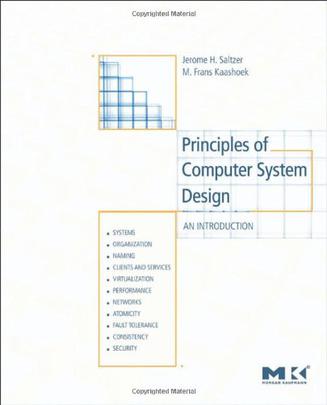欢迎来到相识电子书!
标签:System
-
Principles of Computer System Design
This text identifies, examines, and illustrates fundamental concepts in computer system design that are common across operating systems, networks, database systems, distributed systems, programming languages, software engineering, security, fault tolerance, and architecture. Through carefully analyzed case studies from each of these disciplines, it demonstrates how to apply these concepts to tackle practical system design problems. To support the focus on design, the text identifies and explains abstractions that have proven successful in practice such as, remote procedure call, client/service organization, file systems, data integrity, consistency, and authenticated messages. Most computer systems are built using a handful of such abstractions. The text describes how these abstractions are implemented, demonstrates how they are used in different systems, and prepares the reader to apply them in future designs. Features: Concepts of computer system design guided by fundamental principles. Cross-cutting approach that identifies abstractions common to networking, operating systems, transaction systems, distributed systems, architecture, and software engineering. Case studies that make the abstractions real: naming (DNS and the URL); file systems (the UNIX file system); clients and services (NFS); virtualization (virtual machines); scheduling (disk arms); security (TLS). Numerous pseudocode fragments that provide concrete examples of abstract concepts. Extensive support. The authors and MIT OpenCourseWare provide on-line, free of charge, open educational resources, including additional chapters, course syllabi, board layouts and slides, lecture videos, and an archive of lecture schedules, class assignments, and design projects. -
Operating System Concepts, Seventh Edition
Keep pace with the fast-developing world of operating systems Open-source operating systems, virtual machines, and clustered computing are among the leading fields of operating systems and networking that are rapidly changing. With substantial revisions and organizational changes, Silberschatz, Galvin, and Gagne’s Operating System Concepts, Eighth Edition remains as current and relevant as ever, helping you master the fundamental concepts of operating systems while preparing yourself for today’s emerging developments. As in the past, the text brings you up to speed on core knowledge and skills, including: What operating systems are, what they do, and how they are designed and constructed Process, memory, and storage management Protection and security Distributed systems Special-purpose systems Beyond the basics, the Eight Edition sports substantive revisions and organizational changes that clue you in to such cutting-edge developments as open-source operating systems, multi-core processors, clustered computers, virtual machines, transactional memory, NUMA, Solaris 10 memory management, Sun’s ZFS file system, and more. New to this edition is the use of a simulator to dynamically demonstrate several operating system topics. Best of all, a greatly enhanced WileyPlus, a multitude of new problems and programming exercises, and other enhancements to this edition all work together to prepare you enter the world of operating systems with confidence.
热门标签
下载排行榜
- 1 梦的解析:最佳译本
- 2 李鸿章全传
- 3 淡定的智慧
- 4 心理操控术
- 5 哈佛口才课
- 6 俗世奇人
- 7 日瓦戈医生
- 8 笑死你的逻辑学
- 9 历史老师没教过的历史
- 10 1分钟和陌生人成为朋友


